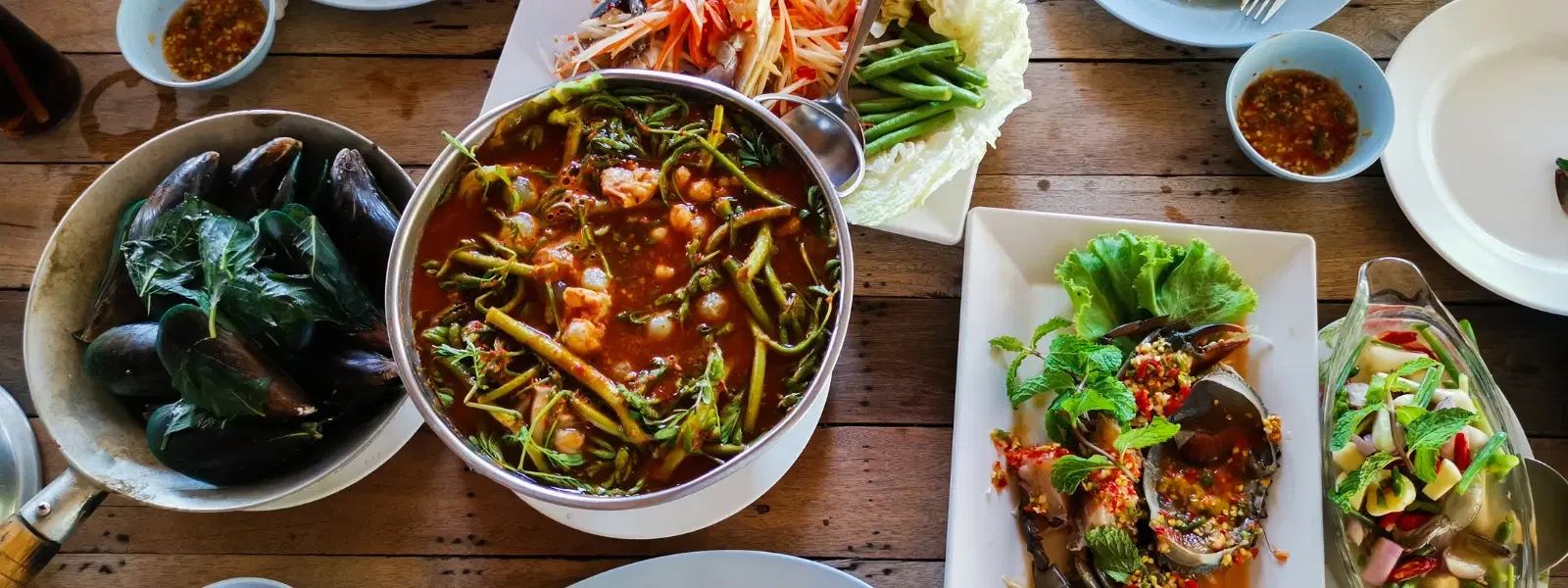
Hotels
•03 min read

Khasi food in Shillong offers a journey of flavors. It unveils a rich culinary heritage that is deeply rooted in tradition and culture. This blog will answer common questions about Khasi food specialties including Jadoh and Dohkhlieh, and explore their cultural significance in Shillong. By reading further, you'll gain insights into the origins, preparation techniques, and cultural significance of these tantalizing local Shillong delicacies, enriching your travel experience in India.
The culinary traditions of the Khasi people are steeped in history, forming an intrinsic part of Meghalaya's cultural tapestry. Khasi tribal dishes tell a story of a community that places great emphasis on locally sourced, fresh ingredients such as black sesame, fermented soybeans, and a unique blend of indigenous spices. According to local culinary experts, each dish reflects the simplicity and authenticity of the Khasi lifestyle, inviting you to savor the genuine flavors passed down through generations.
In Khasi cuisine, simplicity and natural ingredients take center stage. Traditional recipes emphasize freshness and subtlety, allowing the authentic taste of each ingredient to shine. Iconic dishes such as Jadoh, Dohkhlieh, and Pumaloi are not just meals—they are integral parts of Khasi celebrations and festivals. Historical records suggest that these culinary practices highlight a respect for nature and a commitment to preserving traditional methods, which continue to influence the vibrant Shillong street food scene today.
Jadoh is a celebrated dish in Meghalaya, revered for its robust yet balanced flavors. This traditional Khasi rice dish is typically prepared with pork or chicken, infused with turmeric, ginger, and garlic—a combination that not only enhances its taste but also reflects the region’s culinary heritage. Recognized as one of the top Meghalaya food specialties, Jadoh serves as a delicious symbol of Khasi cultural food traditions.
The secret to a perfect serving of Jadoh lies in its preparation. Using red rice as a base, cooks infuse the dish with aromatic spices and slow-cook the ingredients to achieve a deep, satisfying flavor. For those who aspire to recreate this classic at home, here are a few tips:

Always opt for fresh, local ingredients.
Respect the slow cooking process to allow the spices to meld.
Experiment with indigenous herbs for added authenticity.
These steps will help you capture the authentic taste of an authentic Jadoh recipe that truly honors the Khasi culinary legacy.
Dohkhlieh is a refreshing Khasi pork salad that combines the simplicity of boiled pork with the zest of onions, chilies, and lime juice. This dish stands out for its vibrant mix of flavors—tangy, spicy, and invigorating all at once. As a cherished dish among local Shillong delicacies, Dohkhlieh offers an ideal balance for those seeking a lighter, palate-awakening option during their culinary adventures.
Dohkhlieh is more than just a dish—it's a reflection of the Khasi philosophy of embracing bold flavors through simple means. Its straightforward preparation underscores a deep respect for the natural ingredients, mirroring the Khasi way of life. Whether served as a starter or a side, this Dohkhlieh pork salad is versatile enough to complement a range of traditional dishes, making it a staple on family tables and festive gatherings alike.
The streets of Shillong offer an exciting array of food specialties that capture the essence of Meghalaya. From the hearty Jadoh to the tantalizing Dohkhlieh, and from the soft, steamed Pumaloi to the traditional rice beer known as Kyat, these local Shillong delicacies celebrate a vibrant culinary culture. Food enthusiasts can explore a thriving street food scene that not only delights the senses but also provides a window into the history and daily life of the Khasi community.

Khasi cuisine is wonderfully inclusive. For those who prefer vegetarian options, dishes like Pumaloi and Minil Songa offer satisfying and flavorful alternatives without compromising on authenticity. Meanwhile, meat lovers can indulge in the robust flavors of pork-based specialties. This balance ensures that every palate is catered for, making Meghalaya food specialties accessible to all who seek to experience genuine, culturally rich flavors.
Did you know? Khasi cuisine relies heavily on fresh, locally sourced ingredients and traditional cooking methods, such as steaming and slow boiling, to preserve the natural flavors of the food.
Dohkhlieh is a traditional Khasi pork salad made with boiled pork, onions, chilies, and lime juice, offering a refreshing and tangy flavor.
Jadoh is a popular Khasi rice dish cooked with pork or chicken, flavored with turmeric, ginger, and garlic, and often considered the Meghalayan version of biryani.
Some of the famous Khasi foods include Jadoh, Dohkhlieh, Pumaloi, Kyat, and Dohneiiong, each showcasing the rich culinary heritage of Meghalaya.
Exploring the world of Khasi food in Shillong is an invitation to discover a vibrant culinary tradition that beautifully marries history with flavor. From the robust spices in Jadoh to the invigorating zest of Dohkhlieh, each dish offers a glimpse into the Khasi way of life and their deep reverence for natural, fresh ingredients. Embracing these Meghalaya traditional recipes not only enriches your travel experience but also deepens your connection with India’s diverse cultural heritage.